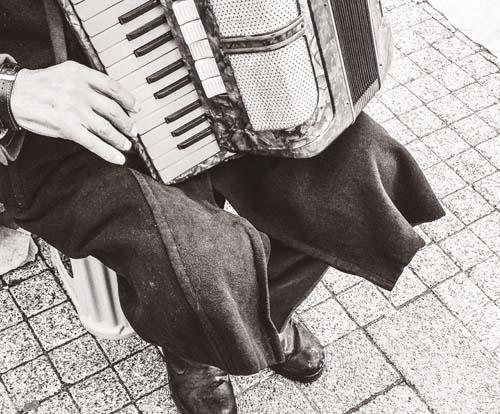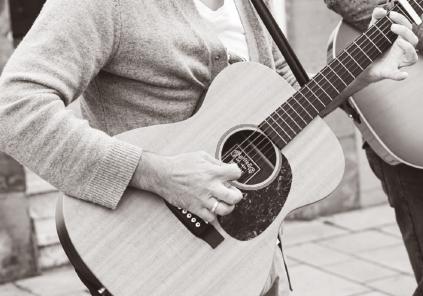查尔斯·狄更斯如何让街头艺人噤声
2018-12-19ByAliceDunn
By Alice Dunn

Imagine hearing only the clip of your heels on the squares of Covent Garden2. If Charles Babbage3 had had his way in 1864 then a walk through town might have been eerily quiet today.
Babbage, the philosopher and mathematician credited with inventing the first design for a mechanical computer, was extremely averse4 to street music. At the time the streets were, he said, wrought with “the most discordant noises.”5 He dedicated an entire chapter of a book to his thoughts on these“instruments of torture,” describing the detrimental6 effects of buskers on the inhabitants of London. Busking, he said, “robs the industrious man of his time; it annoys the musical man by its intolerable badness; it irritates the invalid.”7
He appeared in court to make noise about noise and wrote several letters to The Times expressing his contempt of street music. He was already well-known for being fastidious8. Seven years before his attack on the sounds from the street, he launched an in-depth investigation into the way each of one factorys 464 panes9 of glass came to be broken.
It may come as no surprise to learn that his impassioned musings on street music were met with musicians “of various tastes” playing “worn-out or damaged wind instruments” at his window under the instructions of his revenge-seeking neighbours.10
Babbages attempt was one of two significant movements against street music in 1864. The second was put forward by the aptly named Michael Thomas Bass, MP11. He tried to put his “Act for the Better Regulation of Street Music in the Metropolis” through parliament and rallied support from influential figures including Alfred Tennyson, John Everett Millais, Wilkie Collins and,12 notably, Charles Dickens, who penned the letter that led the signatures of objection to street music.
Dickens objections to public performance did not however extend to readings of his own work. A year before his letter to parliament, Dickens read A Christmas Carol to a crowd of 2000 working-class people in a town hall in Birmingham. He was a great performer who relished13 every moment on stage. His readings created mass hysteria14 with audience members reportedly fainting during his shows. He described the thrill of reading before an audience and said it made him feel like “a giant refreshed.”
The power of an appreciative audience is one that has continued over the years. It is a symbiotic15 relationship, as musician Leo Humphries tells me: “I found busking to be quite scary at first. It feels like youre breaking an unwritten rule of society. But as soon as someone gives you 20 pence, it vindicates16 you. You feel youre supposed to be there, and it becomes incredibly fun. Its very nice to be playing a song and see enjoyment on the faces of people you dont know. The feeling of connection you get with strangers is not something you get in everyday life—especially in London, where eye contact with strangers feels like a transgression17.” And musical talent is richly rewarded: “Someone once gave me £20 for playing ‘Lolaby The Kinks18.”

Perhaps Babbage, Bass and Dickens would be pleased to hear that, to be a busker on the London Underground today, one must pass a rigorous audition process first. The competition to hold a licence is fierce, as Transport for Londons guidelines attest19: “Each busker must go through a shortlist process and then an audition in front of a panel of three judges performing live in one of our stations. Each musician must perform two songs (One prepared number and another selected by the panel, from a submitted set-list.) The judging process reviews the musicians repertoire20, musicality, technical skill and performance. If successful, the musician will receive a 12-month licence to perform on the Underground.”
Last year more than 600 musicians auditioned and 70 were granted licences. If anyone was in any doubt, busking on the Tube is much more than tapping your foot to the beat of your accordion21.
The method of tipping buskers is changing. London is the first city in the world to introduce a contactless card payment scheme. But will that deter giving physical money? Soprano Seija Knight busks in Covent Garden and tells me: “The younger generation are more than happy to put a few quid from their card on a machine.22 But the older generation can feel a little offended that this service is being offered.”
Whether you prefer hearing the percussive chink of coins hitting a guitar case or the beeps of a card machine,23 its being accompanied by great music that really matters.
假如你走在科文特加登廣场上,只能听到自己的脚步声,那会是什么感觉?要是1864年查尔斯·巴贝奇经过了这里,那么如今人们步行穿过伦敦城区,估计会感觉静得可怕。
查尔斯·巴贝奇是哲学家,也是数学家,因发明了第一台机械计算机而闻名。他特别讨厌街头音乐。在他那个时候,用他的话说,街上充斥着“最刺耳的噪音”。他在一本书里花了一整章来抱怨这些“折磨人的乐器”,描述这些街头艺人对伦敦居民的有害影响。他说,街头艺术“让辛勤工作的,浪费了时间;让专搞音乐的,弄脏了耳朵;让抱病在身的,气坏了身子。”
因为嫌街头音乐吵闹,他跑到法庭上去闹,还给《泰晤士报》写了好几封信,表达对街头音乐的不满。他那吹毛求疵的劲儿,其实早已声名远扬。在向街头音乐发起攻击的七年前,他就对一家工厂进行过深度调查,调查他们的464块玻璃每块是如何碎掉的。
于是,邻居们叫来“风格各异”的音乐家们,在他的窗下玩起了“老旧破损的管乐器”,来报复他对街头音乐的猛烈抨击,也就不足为奇了。
巴贝奇的努力是1864年反对街头音乐的两股浪潮之一。另一波的推动者是议员迈克尔·托马斯·巴斯。他试图让议会通过“对城市街头音乐进行更好管控的提案”,还专门联合了一些有影响力的名人来表达抗议,如艾尔弗雷德·丁尼生、约翰·埃弗里特·密莱司、威尔基·科林斯和大名鼎鼎的查尔斯·狄更斯。狄更斯带头写过一封针对街头音乐的联合签名反对信。
不过,狄更斯对这种公开表演的反对并没有殃及自己的作品朗诵活动。在写公开信给议会的前一年,他还在伯明翰的市政大厅里,给两千名来自工人阶级的听众朗读了他的《圣诞欢歌》。他是一名很棒的表演者,享受在舞台上的每一分钟。他朗诵时会掀起阵阵狂热,有好几位听众据说都激动得晕了过去。狄更斯描述了在听众前朗读的快感,并说这让他感觉自己像“一个满血复活的巨人”。
热情的听众带来的能量是经久不衰的。这是一种共生的关系,正如音乐家利奥·汉弗莱斯对我说的:“我最开始觉得街头音乐特别吓人,仿佛打破了社会上不成文的规定。可是一旦有人给你20便士,你就会立刻受到鼓舞。你感觉自己的存在合理了,并且整个过程变得非常好玩。演奏一首歌,看着不相识的听众脸上沉醉的表情,这种感觉棒极了。由此与陌生人产生的联系是日常生活中难以得到的——尤其是在伦敦这种地方,连直视陌生人都像是罪过。”并且付给音乐天才的报酬也不低:“有人曾因为我演奏了奇想乐队的《罗拉》,给过我20英镑。”
但是,下面这话,或许巴贝奇、巴斯和狄更斯听到会倍感欣慰:如今要想在伦敦地铁站当个艺人,得先通过一场严格的试演。经过激烈的竞争后,才能获得执照。伦敦交通局规定:“进入候选阶段后,每位街头艺人都得在某个地铁站台里,面对由三人组成的评审团进行现场演出。表演曲目有两首(一首自选,另一首由评审团从规定曲目中抽取)。评审员主要从表演曲目、音乐才能、专业技巧和演出表现四个方面评分。一旦通过,即可获得为期12个月的地铁表演许可。”
去年有超过600位音乐人士参加了试演,只有70人获得了执照。所以不必怀疑,在地铁里演奏可比跟着手风琴的节拍跺跺脚难多了。
给街头艺人小费的方式也在改变。伦敦是世界上第一个引入非接触式磁卡支付方案的城市。此举是否会影响给现金的小费呢?在科文特加登表演的女高音歌唱家塞亚·奈特告诉我:“年轻人更愿意用刷卡机刷掉几镑,但是老年人觉得这样有点侮辱人,所以更愿意给现金。”
当然,不管你是愿意听硬币碰到吉他盒的脆响,还是刷卡机的滴滴声,真正重要的还是在一旁响起的美好音乐。
1. Charles Dickens: 查尔斯·狄更斯(1812—1870),英国批判现实主义小说家;busker: 街头艺人。
2. Covent Garden: 科文特加登,伦敦的一处广场,以经营历三个世纪之久的水果蔬菜市场而闻名,如今已成为剧院、酒吧、咖啡馆、手工艺品市场、服装店的汇集之地,也是一个著名的街头表演地点。
3. Charles Babbage: 查尔斯·巴贝奇(1792—1871),英国数学家和发明家,现代自动计算机的创始人。
4. averse: 反对的,嫌恶的。
5. wreak: 造成严重破坏;discordent:(声音)刺耳的,不和谐的。
6. detrimental: 有危害的。
7. industrious: 勤劳的,勤奋的;invalid:病人,伤残者。
8. fastidious: 挑剔的,过分讲究的。
9. pane: (窗户或门上的)一块玻璃。
10. impassioned: 充满激情的;musing:沉思,冥想;wind instrument: 管乐器。
11. MP: Member of Parliament,议员。
12. Alfred Tennyson: 艾尔弗雷德·丁尼生(1809—1892),英国维多利亚时代的杰出诗人;John Everett Millais:约翰·埃弗里特·密莱司(1829—1896),英国画家;Wilkie Collins:威尔基·科林斯(1824—1889),英国小说家,著名神秘故事作家。
13. relish: 享受,喜欢。
14. hysteria: 歇斯底里。
15. symbiotic: 共生的。
16. vindicate: 证明……正确。
17. transgression: 违法,罪过。
18. The Kinks: 奇想乐队,是活跃于20世纪六七十年代的英国摇滚乐队。
19. attest: 表明,证明。
20. repertoire: 全部曲目。
21. accordion: 手風琴。
22. soprano: 女高音;quid: 一英镑。
23. percussive: 敲击的,撞击的;chink:叮当声;beep: 嘟嘟声,滴滴声。
